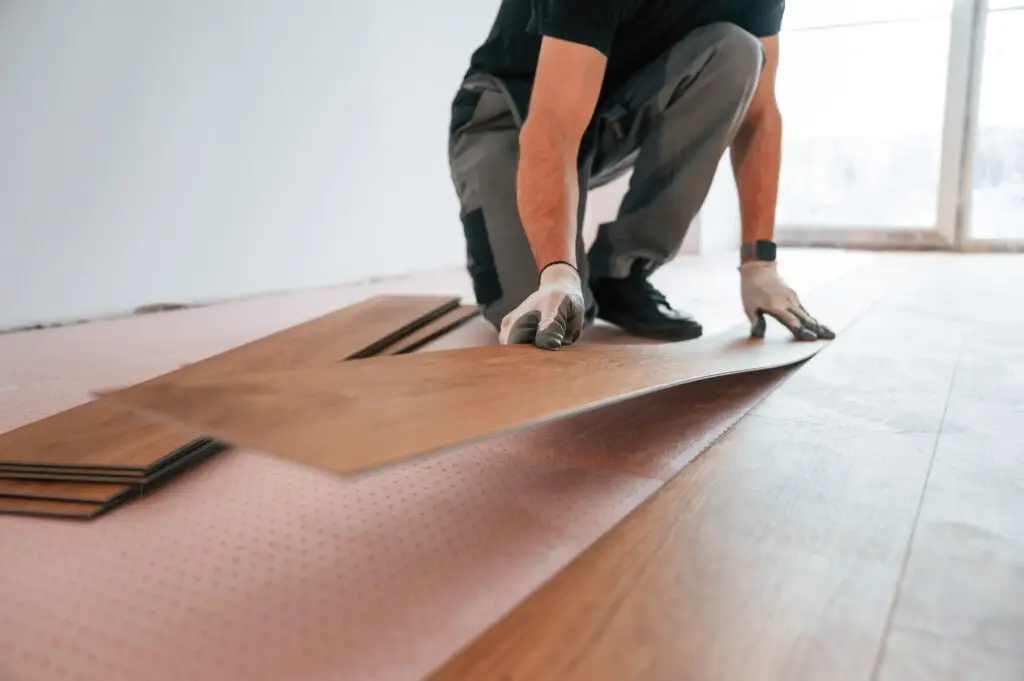Choosing the right flooring company is a critical step in any home renovation project. Whether you’re installing new hardwood, refinishing existing floors, or exploring other flooring options, the quality of the installation and service can make all the difference in the final result and your long-term satisfaction. With so many options available, how do you find a reliable, skilled, and trustworthy flooring contractor near you? This guide will walk you through the essential steps to ensure you choose the best professionals for your flooring needs.

What to look for in a flooring contractor
When evaluating potential flooring contractors, look beyond just the price. Several key indicators point to a reputable and high-quality company.
- Licensing and insurance:
- Licensing: Verify that the contractor is properly licensed to operate in your state or locality. A license indicates they meet certain professional standards.
- Insurance: Ensure they carry both liability insurance and worker’s compensation insurance. Liability insurance protects your property in case of damage during the project, and worker’s compensation protects you from financial responsibility if a worker is injured on your property. Request proof of both.
- Experience and specialization:
- Years in Business: A company with a long-standing history often indicates stability and reliability.
- Relevant Experience: Look for contractors with specific experience in the type of flooring you’re interested in (e.g., hardwood installation, refinishing, or specialized flooring types). Expertise leads to better results.
- Reputation and references:
- Online Reviews: Check major review platforms (Google, Yelp, Houzz, Angie’s List, BBB) for overall ratings and consistent feedback.
- References: Ask for a list of recent clients you can contact. A reputable contractor will be happy to provide these.
- Professionalism and communication:
- Prompt Responses: Do they respond to your inquiries in a timely manner?
- Clear Communication: Are they articulate and transparent about the process, materials, and costs? Do they explain things in a way you understand?
- Site Visit: Do they insist on an in-person site visit to accurately assess your needs and provide an estimate?
- Transparent quoting:
- Detailed Estimate: A good quote should be comprehensive, itemizing materials, labor, demolition, and any other associated costs. Avoid vague or “all-in-one” pricing.
- No Hidden Fees: Ensure there are no unexpected charges that could pop up later.
- Warranties and guarantees:
- A reliable contractor stands behind their work. Ask about warranties on installation labor in addition to manufacturer warranties on materials.
Questions to ask before hiring
Once you’ve shortlisted a few contractors, ask these critical questions during your initial consultations. Their answers will help you gauge their expertise and reliability.
- “Are you licensed and insured? Can you provide proof?”
- This is non-negotiable. Always ask for current copies of their license and insurance certificates.
- “How long have you been in the flooring business?”
- More experience often translates to better problem-solving skills and a smoother project.
- “What is your experience with [specific flooring type, e.g., hardwood refinishing, engineered wood installation]?”
- Ensure they have a proven track record with your particular project.
- “Can you provide a list of recent references I can contact?”
- Speak to past clients about their experience with the contractor’s communication, timeliness, and quality of work.
- “Will you provide a detailed, written estimate that itemizes all costs?”
- A comprehensive estimate should include materials, labor, removal of old flooring, subfloor preparation, finishing, and disposal fees.
- “What is your payment schedule?”
- Most contractors require an upfront deposit (e.g., 20-30%), with subsequent payments tied to project milestones. Avoid contractors who demand full payment upfront.
- “What is the estimated timeline for the project, from start to finish?”
- Understand the expected duration and how they handle delays.
- “Who will be working on my project, and are they employees or subcontractors?”
- Knowing who will be in your home is important. If they use subcontractors, ensure they are also insured.
- “What kind of warranty do you offer on your labor and installation?”
- Beyond manufacturer warranties on materials, a good contractor will offer a warranty on their workmanship (e.g., 1-5 years).
- “How do you handle unexpected issues or changes during the project?”
- A clear process for change orders and problem-solving is a sign of professionalism.
- “Will you handle the disposal of old flooring materials?”
- Confirm whether this is included in the estimate or an additional cost.
- “Do you have a portfolio of your previous work I can see?”
- Visual examples can give you a better sense of their quality and style.
Checking reviews and portfolios
Before making a final decision, take the time to thoroughly investigate a contractor’s reputation and review their past work.
- Online Review Platforms:
- Google Reviews: A great starting point for overall satisfaction. Look for patterns in feedback (e.g., consistent praise for communication, recurring complaints about delays).
- Yelp, Houzz, Angie’s List, Better Business Bureau (BBB): These platforms often provide more detailed reviews and can highlight how a company handles complaints.
- Read Between the Lines: Don’t just look at the star rating. Read the actual comments. Are issues addressed professionally? Does the contractor respond to negative reviews?
- Company Website and Social Media:
- Portfolio/Gallery: A professional website should showcase a gallery of their completed projects. Pay attention to the detail, finish quality, and variety of work. Do the “after” photos look truly professional?
- Consistency: Does their online presence match the professionalism you’ve experienced in your interactions?
- References:
- Call Them: Don’t just collect references; actually call them. Ask specific questions about their experience:
- Were they satisfied with the final result?
- Was the project completed on time and within budget?
- How was communication throughout the project?
- Did they handle any unforeseen issues well?
- Would they hire the contractor again?
- Call Them: Don’t just collect references; actually call them. Ask specific questions about their experience:
- Visit Past Projects (if possible): If a contractor offers, and a previous client agrees, seeing their work in person can provide invaluable insight into the quality and durability of their installations.
Comparing quotes and warranties
Once you have received multiple quotes, it’s time to compare them meticulously, looking beyond just the bottom line.
- Compare Itemized Costs:
- Materials: Are they quoting the same quality and type of flooring? Do material costs seem reasonable?
- Labor: Compare labor rates and the estimated hours. Is one significantly higher or lower without clear justification?
- Hidden Fees: Look for any line items that seem vague or might lead to extra charges later (e.g., “miscellaneous,” “contingency”).
- Inclusions/Exclusions: What’s included (e.g., old flooring removal, subfloor prep, trim installation, cleanup) and what’s not? Ensure you’re comparing apples to apples.
- Understand Scope of Work:
- Does each quote clearly define the scope of work? Does it match your expectations and what you discussed?
- Are there any assumptions made by the contractor that you need to clarify?
- Assess Value, Not Just Price:
- The lowest bid isn’t always the best. A significantly lower price might indicate shortcuts in materials, less experienced labor, or hidden costs.
- Conversely, the highest bid isn’t always necessary. Evaluate if the higher price justifies superior materials, specialized expertise, or a more comprehensive service.
- Warranties and Guarantees:
- Labor Warranty: How long do they guarantee their installation work? A reputable company will offer at least a 1-year warranty on labor, often longer.
- Manufacturer Warranties: Clarify how they assist with any material warranty claims should an issue arise with the product itself.
- Damage/Defect Policy: What is their process for addressing defects or damage during or after installation?
Choosing the best flooring company involves thorough research, careful comparison, and clear communication. By following these steps, you can confidently select a contractor who will deliver a high-quality, beautiful, and long-lasting flooring solution for your home.
Ready to find the best flooring company for your home? Sky Hardwood Floors specializes in expert hardwood floor installation, refinishing, and repair, ensuring quality craftsmanship and lasting beauty. We pride ourselves on transparent communication, detailed quotes, and a commitment to customer satisfaction. Contact us today for a free consultation and let us bring your flooring vision to life!
